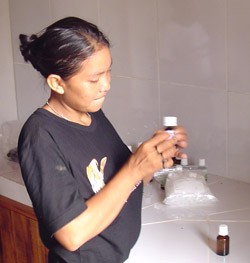
Purei was recently elected head of the Indigenous People’s Association of the Uru-eu-wau-wau, a tribe also known as the Jupaú. As association head, the 25-year-old made his first trip from a remote part of the Amazonian state of Rondônia to São Paulo, Brazil’s megalopolis, where he participated in the Indigenous Markets Fair. His purpose was to show wholesalers the forest products his people are producing under guidance from a USAID-sponsored program.
The Uru-eu-wau-wau are a forest-dwelling tribe that had lived in isolation from the modern world until the 1980’s, when mining and logging activities threatened to destroy the forest and their way of life. Although nearly 2 million hectares of the forest where the tribe lives were set aside as protected lands, illegal mining and logging continues.
In the 1990’s, a USAID-funded environmental association, Kanindé, began working with the tribe to design a forest management program and train the tribe in sustainable forest product harvesting. Today, Uru-eu-wau-wau villages are using nearby forests to produce a variety of products, including copaiba oil. Easily stored and transported, copaiba oil is used in medicines and cosmetics. In the right market, it can even be a lucrative source of income.
Until Purei’s trip to São Paolo, the Uru-eu-wau-wau had sold copaiba oil and other products locally. Now, they are negotiating higher prices through distributors Purei met at the trade fair. When asked what his tribe planned to do with the income, Purei said their top priority was conserving the forest that had protected and fed their ancestors for centuries: “Our biggest worry is that the forest not be destroyed, not to make money. We want to get resources to help us to protect the forest.”
With access to sustainable harvesting techniques and inroads into global markets, the Uru-eu-wau-wau now have a chance to preserve their way of life and save the forest they love.







Comment
Make a general inquiry or suggest an improvement.